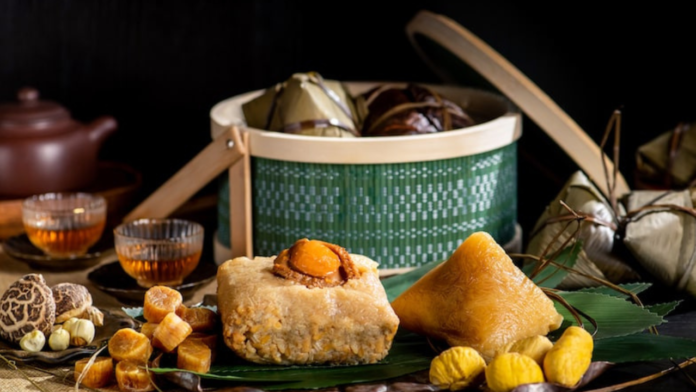Dragon Boat Festival, or Duanwu Festival (端午节 – Duānwǔ Jié) — Beyond exciting boat races, this celebrated holiday is also known for its food! Each dish carries deep cultural significance, each name laden with history and symbolism. If you’re celebrating in China or abroad, learning the Chinese names of these various celebratory foods can enhance your appreciation of this ancient festival.
1. Zongzi (粽子 – Zòngzi) – The Festival Signature Dish
The Meaning Behind the Name
The most significant food of the Dragon Boat Festival is zongzi (粽子). The character “粽” (Zòng) is pronounced similarly to “忠” (Zhōng), which means loyalty—a apt homage to Qu Yuan (屈原), the poet linked to the festival.
Names and Regional Variants
- Cantonese Zongzi (广东粽 – Guǎngdōng Zòng):Commonly large and stuffed with pork, mung beans, and salted egg yolk.
- Shanghai Zongzi (上海粽 – Shànghǎi Zòng): Slightly sweeter, often with red bean paste in them.
- Jianshui Zongzi (碱水粽 – Jiǎnshuǐ Zòng): A yellow, alkaline-water zongxi, typically enjoyed with sugar or honey.
- Taiwanese Zongzi (台湾粽 – Táiwān Zòng): Peanuts, dried shrimp and shiitake mushrooms.
2. Salted Duck Eggs (咸鸭蛋 – Xián Yādàn): A Golden Treasure
Symbolism of Salted Duck Eggs
Salted duck eggs are a typical accompaniment to zongzi, and their golden yolks represent fortune and prosperity. The Chinese word “咸” (Xián) means salty; “蛋” (Dàn) means egg — and that’s just the start of a flavorful and festive delicacy.
How They Are Enjoyed
- Eaten whole alongside zongzi.
- Mashed into congee (粥 – Zhōu) for a savory早餐.
- Utilized as a filling in pastries, including mooncakes.
3. Imperial Docker: The Protective Drink
The Story Behind Realgar Wine
One traditional drink consumed during the festival is Realgar wine, 雄黄酒 (Xiónghuáng Jiǔ) in Chinese. It was thought to protect against evil spirits and diseases.
Why People Drink It
- The character “雄” (Xióng) translates to “powerful,” indicating strength and protection.
- In ancient times, parents would smear realgar wine on children’s foreheads to ward off bad luck.
4. Five-Poison Cake (五毒饼 – Wǔdú Bǐng): A Potion of Protection
What’s in a Name?
The name of this pastry may sound heavy, but it actually references driving away harmful creatures. The “五毒” (Wǔdú) means five poisonous animals—scorpions, snakes, centipedes, toads and spiders, which are believed to be in their prime in summer. Men eat the cake as in a social allegory for the protectionists of the kingdom.
All Kinds of Five-Poison Cake
- There are sweet versions with red bean paste or jujube filling, too.
- Savory variations using sesame or nuts.
- Some bear depictions of the five creatures to boost the protective symbolism.
5. Herbal Goodness: Mugwort Pancakes (艾草饼 – Àicǎo Bǐng)
Why Mugwort?
Mugwort (艾草 – Àicǎo) is a medicinal herb believed to drive away evil and insects. In addition to hanging people, it around their homes during the festival, eat it as pancakes or rice cakes.
Variations and Regional Names
- Mugwort Rice Cake ( 艾草年糕 – Àicǎo Niángāo): A chewy, glutinous rice cake version.
- Mugwort Dumplings (艾草汤圆 – Àicǎo Tāngyuán): Small, round rice dumplings that have sweet fillings.
A Language and Ceremony of Community
Each food item consumed during the Dragon Boat Festival has its own tale to tell. From zongzi (粽子) to protective realgar wine (雄黄酒) and five-poison cake (五毒饼), the blood-curdling foods are steeped in history and culture.
So next time the occasion calls for a celebrate ion, try twelve of these traditional foods in Chinese and really get into the spirit of the festival, and connect with the rich heritage of this festivity, by sitting down to this exquisite, delicious meal!

